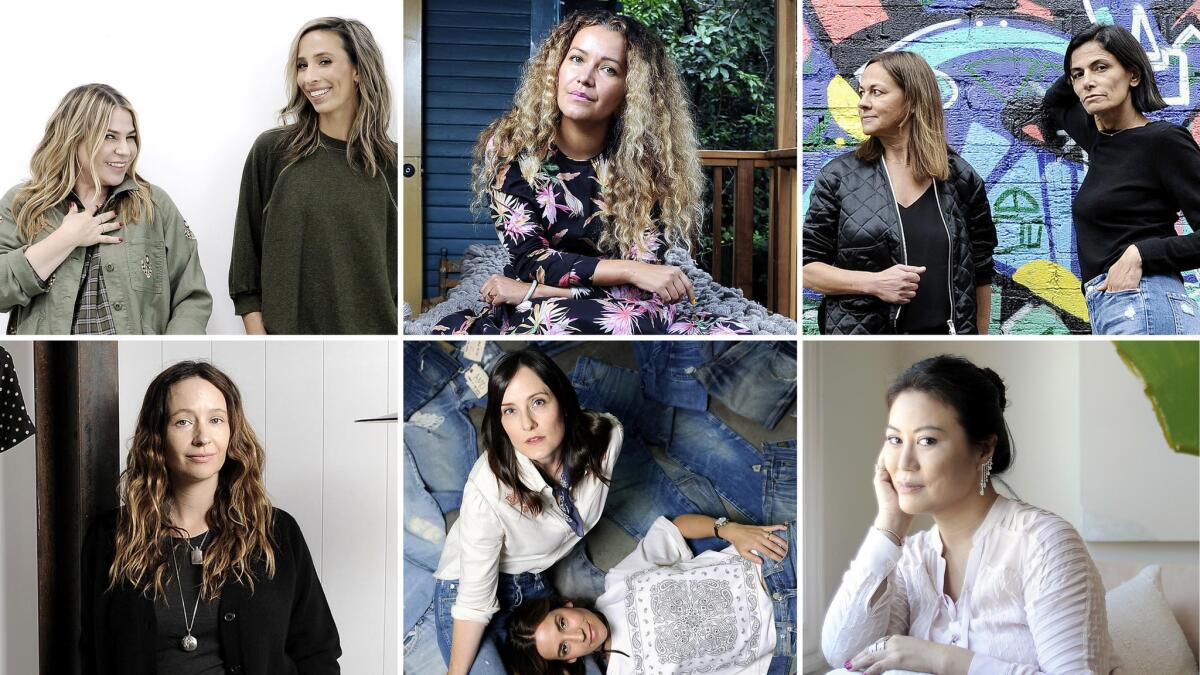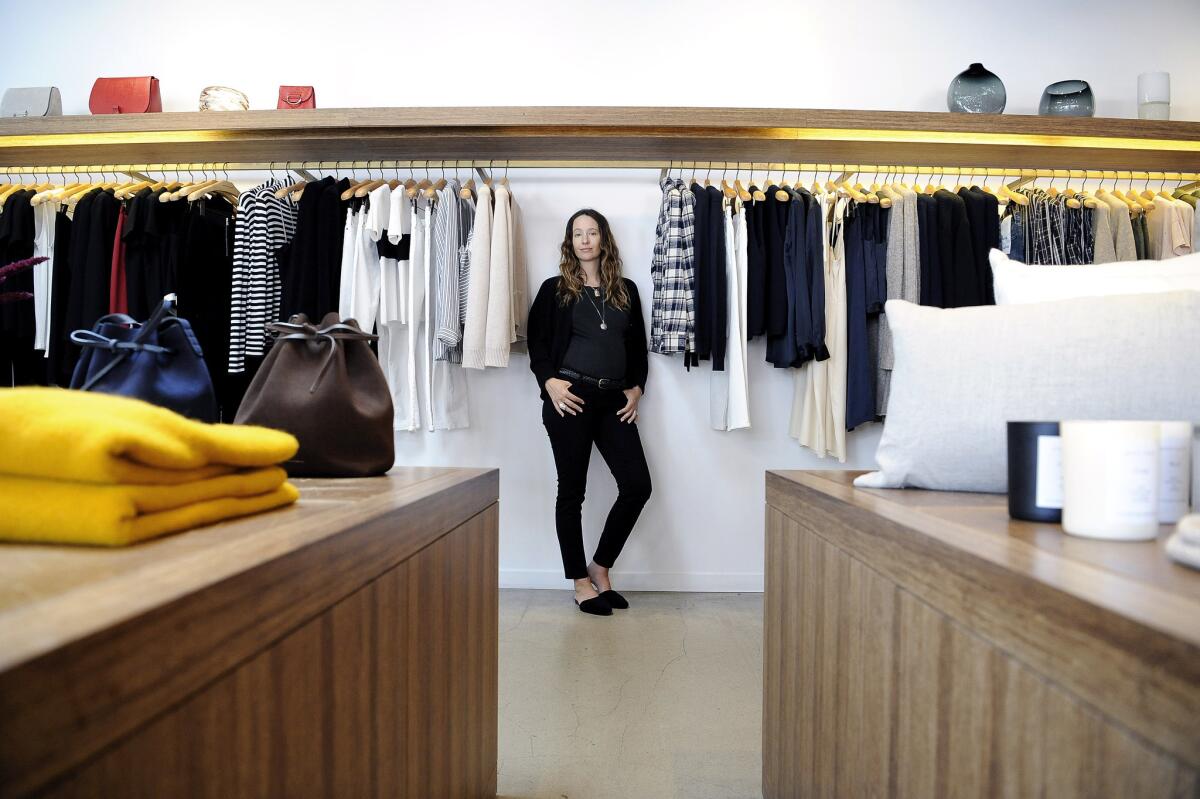Fashion in L.A. marches to the beat of its own drum, and now the world is listening

Editor’s note: In 2007, the Los Angeles Times launched the Image section. The first issue included a story about nine designers who were changing the L.A. look. To mark Image’s 10th anniversary, here are stories about nine L.A. designers (including one about Jenni Kayne, who was named in the 2007 story) whose work covers everything from high-end jewelry and luxury footwear to, yes, jeans, T-shirts and tracksuits, which are having a moment again.
These nine — Anita Ko, Marjan and Maryam Malakpour of Newbark, Meritt Elliott and Emily Current of the Great, Beatrice Valenzuela, Kelly Urban and Misty Zollars of Amo and Kayne — show how the West Coast’s creativity has continued to help define L.A. as a major hub in the world for luxury and style brands.
— Marques Harper, Fashion Editor
You know these Los Angeles looks. The velour tracksuit (usually monogrammed), Ugg boots scrunched onto the flared hem of pants and that uniform of overworked jeans and an embellished T-shirt.
During the 1990s, those were some of the signature looks worn in — and coming out of factories from — Los Angeles. While the ’90s are having a pop-culture comeback, the city, which is home to hundreds of designers, has seemingly shed that dubious sartorial identity.
“It’s been said L.A. is more casual and about denim and tees,” Steven Kolb, the president and chief executive of the Council of Fashion Designers of America, says, “but that isn’t really the case anymore.”
This massive wave of change has occurred not only in the aesthetics of the city and its fashion-conscious citizens, but with the clothing labels based here.
For the most part, fashion brands have evolved with the cultural renaissance of Los Angeles. They have become more sophisticated and complex and, for some, confident in their casualness and ownership of the coastal lifestyle that resonates globally as aspirational.
Since the ’90s and ’00s, the fashion industry has changed too — in a way that favors the Wild West sensibility of L.A. Think free-spirited, community-oriented, less structured and well-rounded. That translates nicely to social media content, a modern-day currency for brands. And many New York and European designers have also eschewed the traditional runway presentation in favor of making their mark in Los Angeles.
“It’s more about the future than the past in L.A.,” says Jeff Fowler, president of North America for online fashion retailer Farfetch, which has its U.S. headquarters in a 25,000-square-foot building in downtown and photo studios in Boyle Heights. According to Fowler, the e-commerce fashion site also counts about 20% of its total U.S. retail partners as being located in L.A. “It has a history but not like New York or Paris. Jenni Kayne is an example of a designer taking a beautiful rendition of the most beautiful parts of L.A. but also looking forward. It feels fresh and young and forward-looking. That optimism is felt here.”
In the last five years, Burberry, Dior,
Tommy Hilfiger , Tom Ford, Stella McCartney, Saint Laurent and Rebecca Minkoff have all had major fashion events here.
In the last five years, Burberry, Dior, Tommy Hilfiger, Tom Ford, Stella McCartney, Saint Laurent and Rebecca Minkoff have all had major fashion events in Los Angeles with celebrity-heavy crowds, and online retailers Net-a-Porter and Farfetch have increased their media outreach and frequency of events here for fashion influencers in the last two years.
CFDA’s Kolb says there are now 100 L.A. designers who are members of the organization. That’s one-fifth of the overall roster, and it includes Rodarte, Chrome Hearts, Monique Lhuillier, Jennifer Meyer, Irene Neuwirth and the Great (whose designers, Meritt Elliott and Emily Current, are part of our Fashion Forward profiles). The CFDA is also represented inside the new Fred Segal flagship store on Sunset Boulevard with a shop-in-shop that features the lines of CFDA designers from all over the world.
Jennifer Mankins, who owns four Bird boutiques in Brooklyn, opened her first location outside of New York last year. It’s a 5,000-square-foot space at Culver City’s Platform shopping development. She has increased the Los Angeles-based brands she carries from one to a current roster that counts more than a dozen designers. She says beyond the more robust fashion scene coming out of L.A. — spanning from casual to red carpet — the city’s manufacturing and (relatively) less cut-throat, more-collaborative attitude by the fashion industry make L.A. more attractive than ever.

“I’ve really been excited about the re-energized manufacturing in L.A.,” Mankins says. She mentions designer Raquel Allegra, who has all aspects of her business, including designing and manufacturing, housed under one roof in a building in downtown L.A.’s garment district. “It’s more sustainable, and you can see it really happen in L.A., whereas in New York, it’s this sort of a dying battle against hotel developers. I think this has led a lot of people to start their own brand in L.A. because the entry into it is just easier.”
The fashion that we see from Los Angeles beats to its own drum and doesn’t follow trends; it has its own style and aesthetic.
— Elizabeth von der Goltz, global buying director for Net-a-Porter
Aside from the more practical aspect of being an L.A. brand, there is a less-traditional approach to designing that often shirks trends.
“This kind of individualism really speaks to a true fashion customer,” says Elizabeth von der Goltz, London-based Net-a-Porter’s global buying director. “Designers are creating from their own personal point of view and lifestyle.”
Above all, Von der Goltz says, “The fashion that we see from Los Angeles beats to its own drum and doesn’t follow trends. It has its own style and aesthetic.”
Moving fashion forward: Jenni Kayne | Anita Ko | Beatrice Valenzuela | Newbark | The Great | Amo



